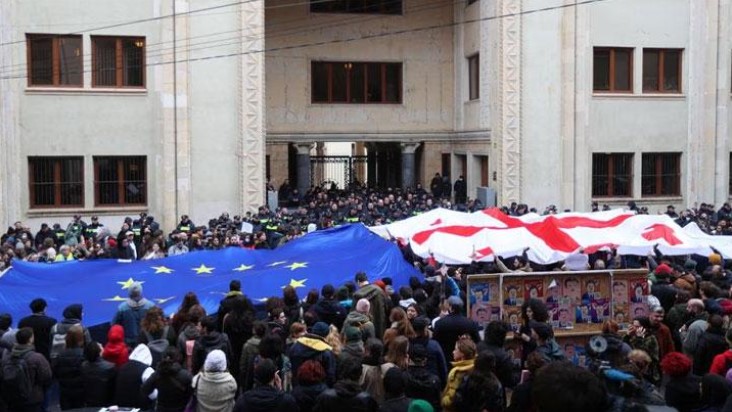
Foto diambil dari Reuters
STRATEGIC ASSESSMENT. October 27, long-standing tensions surrounding Georgia’s parliamentary elections came to a head when President Salome Zourabichvili called for mass protests, rejecting the results of the previous day’s vote. Zourabichvili’s call to action came shortly after reports of widespread voter fraud, allegedly orchestrated by the pro-Russian ruling party, Georgian Dream (GD). The President warned that accepting the election outcome would “legitimize Russia’s takeover of Georgia.” To many Georgians, this development comes as no surprise. For months leading up to the election, opposition politicians, regional experts, and Western leaders had been raising concerns about the potential for voter fraud and intimidation conducted by Georgia Dream around election time. They viewed this as Georgia’s most critical election in modern history, one that would determine the country’s future trajectory — either veering towards pro-Russian authoritarianism or resuming its path toward European Union accession.
Before the election, polling data pointed to early signs of irregularities. Polls commissioned by GD and those by opposition parties revealed wide discrepancies, with gaps exceeding 20 points leading up to Saturday’s vote. During the election, videos surfaced showing instances of ballot stuffing, violations of voter privacy — where voting booths were not private and votes were captured on camera by individuals potentially placed to intimidate — violence against journalists and observers, both inside and outside polling stations, and equipment malfunctions. There were also widespread reports of double voting, bribery, vote buying schemes, the counting of invalid ballots, and voter intimidation.
Europe Elects, a non-profit organization that provides verified election data, along with independent statisticians, uncovered statistical evidence of widespread tampering in favor of Georgian Dream. The statistical anomalies, according to Europe Elects and other observers, resembled those often seen in Russian elections, known as the “Russian tail,” where a suspicious spike in voter distribution suggests miscounting or ballot stuffing. In response, democratic watchdog groups, Western institutions, and European leaders have called for thorough investigations into the election process. Charles Michel, President of the European Council, urged Georgian authorities to investigate the alleged irregularities, while U.S. Secretary of State Antony Blinken echoed the call for an inquiry, condemning “all violations of international norms.”
While many Western leaders are calling for further investigation into the recent election, President Zourabichvili and other opposition politicians are firm in their accusations of Georgian Dream’s corruption and Russia’s interference. Zourabichvili even referred to Saturday’s election results as a Kremlin “coup” and a “Russian special operation.” These claims are not unfounded, especially following similar accusations against Russia in Moldova’s elections just a week earlier. In Moldova, a scheme was exposed in which Russia attempted to bribe at least 130,000 voters with a total of $15 million to elect a pro-Russian candidate. In Georgia, there is significant evidence pointing to similar Russian interference in its electoral process.
In the months prior to the Saturday elections, Georgian Dream made significant pro-Russian, authoritarian gains. In late September, it passed a law banning so-called “LGBTQ+ propaganda.” In practice, this law restricts the freedom of LGBTQ+ citizens to assemble, effectively banning events like pride parades. Earlier this year, the party also enacted a “foreign agents” bill, requiring NGOs, think tanks, media outlets, and advocacy groups receiving over 20 percent of their funding from abroad to label themselves “pursuing the interests of a foreign power.” These recent laws closely mirror Russian legislation, and many experts believe they are a calculated move to strain Georgia’s relationship with the European Union, which granted the country candidate status in 2023.
While the Georgian population overwhelmingly supports EU integration — A poll conducted by the International Republican Institue (IRI) in 2023 found that 89 percent of Georgians either “fully support” or “somewhat support” joining the EU — if straining relations with the EU was Georgian Dream’s goal, it appears to have succeeded. In June, after the “foreign agents” law was passed, EU leaders said it had effectively frozen accession talks. After the most recent “LGBTQ+ Propaganda law” EU officials said it would consider stripping Georgians of visa free access into European countries, citing a “backsliding of democracy.” In August, just a month before the elections, Georgian Dream announced plans to outlaw opposition parties if it secured a parliamentary majority. After last weekend’s developments, many fear that if the election results are upheld, Georgia’s democratic backsliding could worsen, potentially derailing its EU aspirations for good.
Nevertheless, throughout the campaign period, GD politicians continuously claimed that they were not anti-EU but pro-peace, tapping into Georgians’ well-founded fear of war with Russia. Russia invaded Georgia in 2008, and Ukraine in 2022 in part due to their deepening relationships with the West. GD’s propaganda, in the form of banners depicting contrasting images of serene Georgian imagery and pictures of war-ravaged Ukraine, effectively repositioned the parliamentary campaign from pro-West vs. pro-Russia, to instigator vs. conciliator. This use of fear is a well-known Russian hybrid-warfare tactic, often employed to intimidate neighboring countries into compliance. Moreover, GD’s use of Russian tactics goes beyond mere imitation of a powerful neighbor.
The extent of Russian influence over the party cannot be overstated. Georgian Dream’s founder, former prime minister, and “shadow ruler,” Bidzina Ivanishvili, has long been accused of acting as a Russian proxy. Ivanishvili allegedly built his wealth through substantial shares in Gazprom, Russia’s state-owned gas giant. In late September, the U.S. stated it was seriously considering imposing sanctions on Ivanishvili due to his role in deepening ties with Russia and steering Georgia away from its democratic path.
Recently, Ivanishvili suggested that Georgia should apologize for its role in the 2008 war with Russia, despite the fact that Georgia was the victim of Russian aggression. As a result of that war, Russia’s military occupies about 20 percent of Georgia’s internationally recognized territory, specifically the breakaway regions of Abkhazia and South Ossetia. These areas were part of Georgia during the Soviet era, but after the 2008 war, Russia unilaterally recognized them as independent. While most of the world still considers them part of Georgia, Russia has stationed around 7,600 troops in these regions to assert control and prevent its reintegration with Georgia. This military presence continues to this day and is often exploited by GD and the Kremlin to stoke fears that Georgia could suffer a fate similar to Ukraine if it pursues EU accession. Russian interference in Georgia is evident and likely to persist.
The results of Saturday’s election represent a clear win for the Kremlin, which is intent on maintaining its influence in the face of EU and Western integration. As protests continue to grow — with the very real potential to turn violent as they did following the “foreign agents” law — all eyes are on Georgia. While it’s unlikely that Georgian Dream will allow an independent investigation into the election or that the results will be overturned, the coming weeks are crucial. Many Georgians are unlikely to back down in their fight to preserve democracy and may still remember the 2003 Rose Revolution, which followed a parliamentary election dispute and led to the peaceful ousting of the Soviet-era president.





